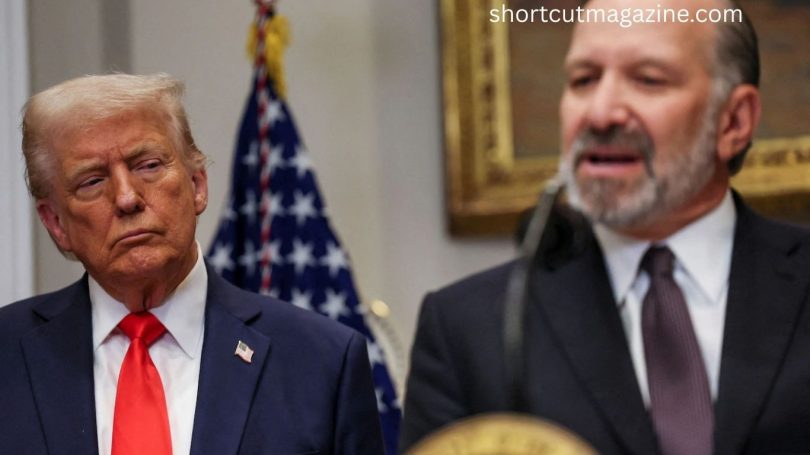Scott Lincicome, vice president of general economics and trade at the Cato Institute, warns that President Donald Trump’s recent announcement that the U.S. government will acquire a 10 percent stake in Intel represents a perilous shift in American industrial policy. This unprecedented move marks a departure from decades of market-oriented principles that have traditionally guided the nation’s economy, signaling an era where government ownership in private enterprise could reshape the landscape of U.S. business.
Intel, a historic leader in the semiconductor industry, has faced years of stagnation and increasing competition from foreign firms. While the company remains a symbol of American technological innovation, critics argue that direct government involvement could distort incentives, reduce efficiency, and ultimately undermine the competitive edge that has allowed U.S. companies to dominate globally.
Read More: Shocking Upset: Crystal Palace Stuns New-look Liverpool in Community Shield Thriller
Historical Context: Free Markets vs. Industrial Policy
For much of the 20th and 21st centuries, the United States has relied on market-driven policies to encourage growth, innovation, and competition. Government intervention has traditionally been limited to regulation, infrastructure, and research funding rather than direct ownership. This approach allowed companies like Intel to thrive in a competitive environment, innovate rapidly, and respond to market signals without the influence of political agendas.
However, the new policy reverses decades of careful economic strategy. Direct government ownership introduces risks such as political interference in corporate decisions, distortion of market dynamics, and potential misallocation of resources. When a private company is partially owned by the state, decisions that should be driven by profitability, innovation, and market demand may instead be influenced by political priorities.
The Intel Case: Risks and Implications
Intel’s challenges are well-known: delayed chip production, competition from firms in Taiwan and South Korea, and increasing pressure from companies like AMD and NVIDIA. While a government stake might provide temporary financial relief, it raises questions about long-term consequences. Will the government now have a say in strategic decisions? Could it prioritize domestic employment over global competitiveness, potentially slowing innovation?
Critics argue that such intervention sets a dangerous precedent. If the U.S. government steps in to “save” one struggling tech company, other firms might expect similar treatment, leading to a slippery slope where market discipline is weakened. Investors may become wary, fearing that profits could be secondary to political objectives. Moreover, international partners may view this as a form of protectionism, potentially igniting trade tensions and retaliatory measures.
Economic Principles at Stake
Economic theory emphasizes the importance of competition, private ownership, and efficient allocation of resources. Government ownership of private companies undermines these principles by introducing external incentives that do not align with market efficiency. While temporary support during crises is sometimes justified, permanent stakes in private enterprises risk distorting incentives and rewarding underperformance.
Supporters of the policy may argue that national security concerns justify government involvement in critical sectors like semiconductors. Indeed, semiconductors are foundational to modern technology, defense systems, and infrastructure. However, there are alternative methods to secure domestic production without taking ownership, such as targeted subsidies, tax incentives, or public-private partnerships. These approaches allow government support without compromising market integrity.
Global Competitiveness and Innovation
America’s technological edge has long relied on free-market principles: risk-taking, private investment, and rapid innovation. Intel’s past success illustrates how companies can grow and adapt under market pressures. Introducing government ownership risks slowing the pace of innovation, as bureaucratic oversight can limit bold decision-making.
Furthermore, this move could influence global perceptions of the U.S. business environment. Foreign investors and partners may see government stakes as a sign that the U.S. is moving away from market-oriented policies, potentially affecting trade relations and investment flows. Maintaining a reputation for competitive, innovation-driven markets is essential for attracting global talent and capital.
Political Overtones and Long-Term Concerns
The timing of this announcement adds a political dimension. Critics warn that government stakes in major corporations can be influenced by short-term political goals rather than long-term economic strategy. Decisions regarding product development, corporate governance, or global expansion could be swayed by political pressures, creating uncertainty for executives, investors, and employees alike.
Additionally, there is a concern that this move could normalize state involvement in other industries. If the government owns a stake in Intel, why not other struggling companies in energy, aerospace, or automotive sectors? Gradually, the private sector could find itself under increasing government influence, eroding the independence that has fueled American economic growth.
Alternative Solutions
Rather than taking an ownership stake, the U.S. government could pursue alternatives that support domestic semiconductor production while preserving market dynamics:
- Targeted Subsidies and Tax Incentives: Provide financial support for research, development, and domestic manufacturing without acquiring equity.
- Public-Private Partnerships: Encourage collaboration between government and private firms on specific projects, such as advanced chip research.
- Trade and Investment Policies: Enhance competitiveness through strategic trade agreements and export incentives.
- Workforce Development: Invest in education and training programs to ensure a steady pipeline of talent for the semiconductor industry.
These strategies can strengthen Intel and the broader industry without introducing the risks associated with government ownership.
Frequently Asked Questions:
What does it mean that the government has a stake in Intel?
It means the U.S. government owns a portion (10%) of Intel, giving it partial influence over company decisions, which is unusual for a private enterprise.
Why is this considered a threat to American greatness?
Experts argue that government ownership in private companies can reduce efficiency, limit innovation, and introduce political influence, weakening the free-market principles that have historically driven U.S. economic success.
Has the U.S. government owned private companies before?
Rarely. Historically, the government has supported companies through subsidies, grants, or regulation, but direct ownership of a major tech company is almost unprecedented.
How could this affect Intel’s competitiveness?
Government involvement could slow decision-making, prioritize political goals over innovation, and make Intel less agile in responding to global competition from companies like AMD, NVIDIA, and foreign chip manufacturers.
Are there benefits to government ownership?
Proponents argue it could help protect critical industries, secure domestic supply chains, and provide financial stability to struggling companies. However, experts say these benefits may come at the cost of long-term innovation and efficiency.
Could this affect other industries?
Yes. Critics warn it could set a precedent for government stakes in other sectors, like aerospace, energy, or automotive, potentially increasing state influence over private enterprise.
Are there alternatives to government ownership?
Yes. Options include targeted subsidies, tax incentives, public-private partnerships, workforce development, and trade policies—all of which support industries without government ownership.
Conclusion
The U.S. government’s decision to acquire a stake in Intel marks a pivotal shift in American industrial policy. While intended to protect domestic technology and strengthen national security, it raises significant risks to innovation, market efficiency, and long-standing free-market principles. Balancing government support with the independence of private enterprise will be crucial to preserving America’s competitive edge. The Intel case serves as a defining moment, highlighting the challenge of fostering economic growth while maintaining the principles that have historically driven American greatness.



